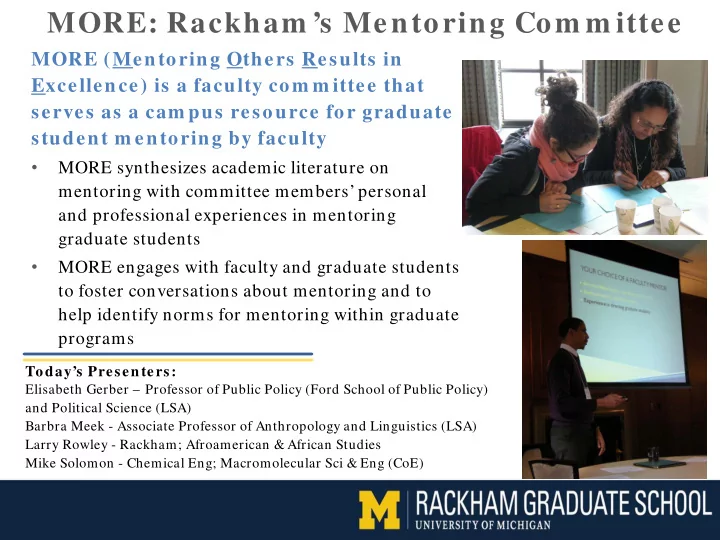

MORE: Rackham ’s Mentoring Com m ittee MORE (Mentoring Others Results in Excellence) is a faculty com m ittee that serves as a cam pus resource for graduate student m entoring by faculty MORE synthesizes academic literature on • mentoring with committee members’ personal and professional experiences in mentoring graduate students MORE engages with faculty and graduate students • to foster conversations about mentoring and to help identify norms for mentoring within graduate programs Today’s Presenters: Elisabeth Gerber – Professor of Public Policy (Ford School of Public Policy) and Political Science (LSA) Barbra Meek - Associate Professor of Anthropology and Linguistics (LSA) Larry Rowley - Rackham; Afroamerican & African Studies Mike Solomon - Chemical Eng; Macromolecular Sci & Eng (CoE)
Introduction: Mentoring Plan Workshop May 11, 20 15 Rackham Graduate School
Overview of schedule: 10:30-11:00 Welcome & Introduction – What is mentoring? 11:00-11:45 Breakout sessions Faculty mentors with Barb Meek & Mike Solomon Doctoral students with Larry Rowley & Liz Gerber 11:45-12:00 Reassemble for discussion of mentoring plans 12:00-12:30 Time for one-on-one work on mentoring plans (Lunch is available)
What is Mentoring? Mentoring is m ore than advising. A mentor actively works to integrate a mentee into a new professional role. Mentoring is our responsibility . A mentor feels some ethical responsibility for the successful development of the student’s career. Mentoring requires an interpersonal relationship . This relationship contributes to the student’s sense of competence, confidence, and effectiveness. Mentoring is challenging . Effective mentoring involves understanding and acknowledging the student’s different identities and communities. Alvarez, A. N., et. al. (2009). Tapping the Wisdom Tradition: Essential Elements to Mentoring Students of Color. Paglis, L., et. al. (2006). Does Adviser Mentoring Add Value? Williams-Nickelson, C. (2009). Mentoring Women Graduate Students: A Model for Professional Psychology.
Ca reful m entoring ca n help a v oid m a ny p itfa lls.
What are the outcom es of effective m entoring for students? Im proved academ ic perform ance Increased productivity Im proved professional skills Higher self confidence Expanded social and professional networks
What are the outcom es of effective m entoring for faculty? Satisfaction of seeing your students grow and succeed Initial investm ent in the m entoring relationship can yield future gains in tim e and productivity Mentees can develop into high-level collaborators which can produce dividends for the faculty m em ber’s scholarship Satisfies faculty m em ber’s ethical responsibility to engage in the academ ic and professional developm ent of the students they train
Challenges in m entoring relationships Mism atch in goals & values Unrealistic and/ or unclear expectations Conflicting interpersonal & com m unication styles Unpredictable support/ com m itm ent Com peting responsibilities
Overview of schedule: 10:30-11:00 Welcome & Introduction – What is mentoring? 11:00-11:45 Breakout sessions Faculty mentors with Barb Meek & Mike Solomon Doctoral students with Larry Rowley & Liz Gerber 11:45-12:00 Reassemble for discussion of mentoring plans 12:00-12:30 Time for one-on-one work on mentoring plans (Lunch is available)
Mentoring is two-way street
What is a m entoring plan? Agreem ent between m entor & student about training/ educational goals Both short-term and long-term goals Specifies am ount/ type of m entoring needed to accom plish goals Modifiable (e.g. yearly) Establishes process to evaluate whether goals are m et
Mentoring Plans are about Mutual Expectations For m entor: What help/ support/ guidance am I willing to provide? What do I need from the student? For student: What help/ support/ guidance do I need? What does m y m entor expect of m e?
Elem ents of Mentoring Plans Long-term , career goals of student Tim ing of academ ic and research m ilestones Frequency and kinds of m eetings Expectations for research progress Availability of opportunities for publication, presentation, and funding Mechanism s for feedback Turnaround tim e for m entor feedback How does student ask for m ore feedback?
Tim e for Mentoring Plan Developm ent • Multiple tem plates available to fram e discussion • Feel welcom e to tailor the tem plates to your pair’s specific needs • The discussion itself is as im portant as the m entoring plan product • A m entoring plan is a dynam ic object – rem em ber to preserve, revisit, and update it as the m entee progresses Electronic v ersions of the tem p la tes in y our fold ers a re a t: http:/ / tinyurl.com / m qsdc4p
Questions? MORE Mentoring Resources • MORE website offers downloads of m aterials: • http:/ / tinyurl.com / m qsdc4 p
Recommend
More recommend